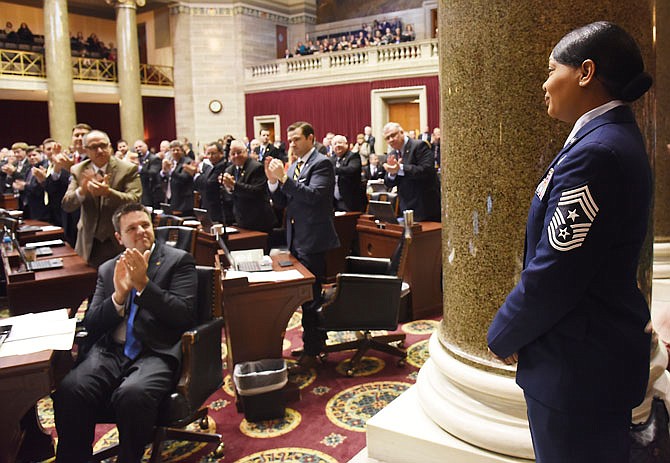As a part of Military Appreciation Day, federal, state and local education stakeholders reminded service members education for their children matters.
"The needs of military children and families may not be unique, but they are certainly more complicated," Don Soifer, executive vice president of the Lexington Institute, said. The institute serves as a Virginia-based think-tank for policy matters as they relate to defense, education, energy and logistics.
The panel of stakeholders also included representatives from nonprofits like Collaborative for Student Success, Missouri school superintendents, the state board of education, and the National Math and Science Initiative.
A recent report released by the Collaborative for Student Success stated about a third of active duty and former U.S. personnel said dissatisfaction with their child's education is a significant factor in whether they continue their military service.
"In the study, 68 percent of respondents said that moving between states added significant challenges to their child's education," said Jim Cowen, executive director for the Collaborative for Student Success. "My feeling is that this is beyond just an issue for our kids, this is a potential readiness issue for our armed forces."
In the United States, there are 1.2 million children of active duty military servicemen and servicewomen, according to Soifer, which is why it makes it even more pertinent for information and communication to be available for parents in the military.
In Missouri, there are two school districts near military bases that offer advanced placement classes that have a partnership with the National Math and Science Initiatives programs (NMSI). The Waynesville School District, near Fort Leondard Wood, was the first to offer advanced placement classes after receiving a grant from the federal Department of Defense Education Activity in 2014 to implement NSMI programs. The Knob Noster school district, near Whiteman Air Force Base, is the second district.
So far, roughly $4.5 million of federal and private money has been invested in the sites, according to Marcus Lingenfelter, senior vice president at the National Math and Science Initiative.
"The end goal is for every military student in the state of Missouri to have the program if the school system wants it," Lingenfelter said.
At Waynesville, the district offers 13 advanced placement classes, and the school's performance has improved by 15 percent over the past four years.
"There are no secrets to our success," Waynesville Superintendent Brian Henry said, "just a combination of relationship building, high expectations and hard work."
Henry told the audience the teachers are the engine behind helping the students successfully meet the expectations of the school's benchmarks.
"It's in our best interest to ensure that the military's spouses and dependents have smooth transitions and experiences with the district so that they may focus on the critical role they have of protecting our nation," Henry said.
Scott Patrick, superintendent of the Knob Noster school district, agreed.
"When military kids come to our schools, and they come back two or three times, we feel like we must give them the support that not only they need but their families need to make sure that school is not a worry," Patrick said. "It's all about supporting the families."

